Related Research Articles
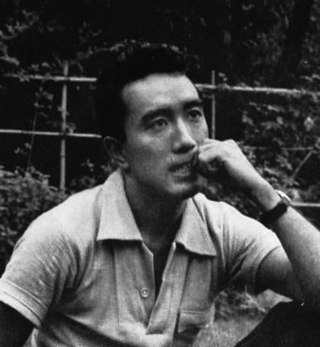
Kimitake Hiraoka, also known as Yukio Mishima, was a Japanese author, poet, playwright, actor, model, Shintoist, nationalist, and founder of the Tatenokai. Mishima is considered one of the most important writers of the 20th century. He was considered for the Nobel Prize in Literature in 1968, but the award went to his countryman and benefactor Yasunari Kawabata. His works include the novels Confessions of a Mask and The Temple of the Golden Pavilion, and the autobiographical essay Sun and Steel. Mishima's work is characterized by "its luxurious vocabulary and decadent metaphors, its fusion of traditional Japanese and modern Western literary styles, and its obsessive assertions of the unity of beauty, eroticism and death", according to author Andrew Rankin.

Spring Snow is a novel by Yukio Mishima, the first in his Sea of Fertility tetralogy. It was published serially in Shinchō from 1965 to 1967, and then in book form in 1969. Mishima did extensive research, including visits to Enshō-ji in Nara, to prepare for the novel.
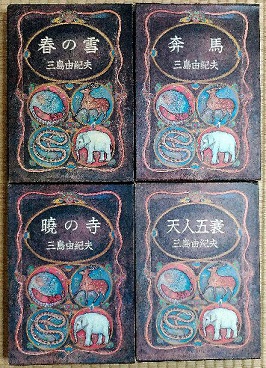
The Sea of Fertility is a tetralogy of novels written by the Japanese author Yukio Mishima. The four novels are Spring Snow (1969), Runaway Horses (1969), The Temple of Dawn (1970), and The Decay of the Angel (1971). The series, which Mishima began writing in 1964 and which was his final work, is usually thought of as his masterpiece. Its title refers to the Mare Fecunditatis, a lunar mare.

The Decay of the Angel is a novel by Yukio Mishima and is the fourth and last in his Sea of Fertility tetralogy. It was published in Shinchosha (orig.) on 25 February 1971, three months after Yukio Mishima's suicide.

Tatsuhiko Shibusawa was the pen name of Shibusawa Tatsuo, a novelist, art critic, and translator of French literature active during Shōwa period Japan. Shibusawa wrote many short stories and novels based on French literature and Japanese classics. His essays about black magic, demonology, and eroticism are also popular in Japan.
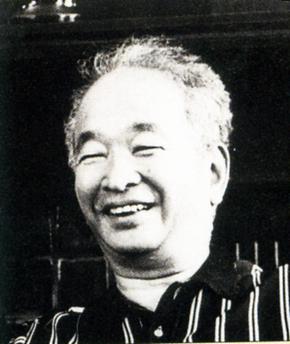
Mitsuo Nakamura was the pen-name of a writer of biographies and stage-plays, and a literary critic active in Shōwa period Japan. His real name was Koba Ichirō.

Tetsuji Takechi was a Japanese theatrical and film director, critic, and author. First coming to prominence for his theatrical criticism, in the 1940s and 1950s he produced influential and popular experimental kabuki plays. Beginning in the mid-1950s, he continued his innovative theatrical work in noh, kyōgen and modern theater. In late 1956 and early 1957 he hosted a popular TV program, The Tetsuji Takechi Hour, which featured his reinterpretations of Japanese stage classics.
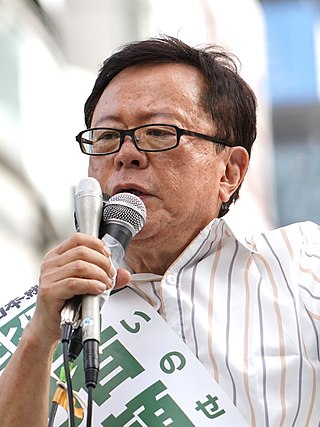
Naoki Inose is a Japanese politician, journalist, historian, social critic and biographer of literary figures such as Yukio Mishima and Osamu Dazai. He served as Lieutenant Governor of Tokyo from June 2007 until becoming Acting Governor on 1 November 2012 following the resignation of Shintaro Ishihara. He was elected Governor in a historical landslide victory in December 2012, but announced his resignation on December 19, 2013, following a political funds-related scandal; his resignation was approved and became effective December 24, 2013.

The Rokumeikan was a large two-story building in Tokyo, completed in 1883, which became a controversial symbol of Westernisation in the Meiji period. Commissioned for the housing of foreign guests by the Foreign Minister Inoue Kaoru, it was designed by British architect Josiah Conder, a prominent Western adviser working in Japan.

Haruko Sugimura was a Japanese stage and film actress, best known for her appearances in the films of Yasujirō Ozu and Mikio Naruse from the late 1940s to the early 1960s.
Hiroaki Sato is a Japanese poet and prolific translator who writes frequently for The Japan Times. He has been called "perhaps the finest translator of contemporary Japanese poetry into American English".
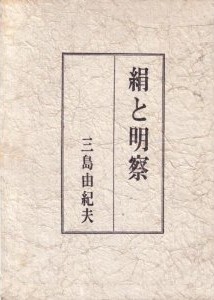
Silk and Insight is a 1964 novel by the Japanese writer Yukio Mishima. The subject of the novel is taken from an actual strike in Japan in 1954 at Omi Kenshi, a silk thread and fabric manufacturer, which lasted for 106 days. The novel was first serialised in the monthly magazine Gunzo between January–October 1964. It was published in hardcover format by Kodansha on 15 October 1964. It was translated into English in 1998 by Hiroaki Sato.
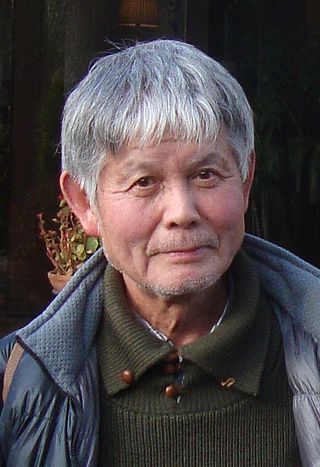
Mutsuo Takahashi is one of the most prominent and prolific male poets, essayists, and writers of contemporary Japan, with more than three dozen collections of poetry, several works of prose, dozens of books of essays, and several major literary prizes to his name. He is well known for his open writing about male homoeroticism. He currently lives in the seaside town of Zushi, several kilometers south of Yokohama, Japan.
The bibliography of Kimitake Hiraoka, pen name Yukio Mishima, includes novels, novellas, short stories and literary essays, as well as plays that were written not only in a contemporary-style, but also in the style of classical Japanese theatre, particularly in the genres of noh and kabuki. However, although Mishima took themes, titles and characters from the noh canon, he included his own twists and modern settings, such as hospitals and ballrooms, which startled audiences who were accustomed to the long-settled originals.
Five Modern Nō Plays is a collection of plays written by Japanese writer Yukio Mishima. Mishima wrote these plays between 1950 and 1955 and presented them as modern plays in Tokyo. Of these five, only The Damask Drum was expressed in the traditional Nō fashion. The Lady Aoi was expressed as a Western-style opera. The plays take older Nō plots or traditional and foreign fairy tales and bring them to a modern setting.
11:25 The Day He Chose His Own Fate is a 2012 Japanese drama film directed by Kōji Wakamatsu. The film was based on the Mishima Incident, which was a failed coup d'etat attempt led by Yukio Mishima in 1970. The film competed in the Un Certain Regard section at the 2012 Cannes Film Festival.
Takehiro Hira is a Japanese theatre, film, and television actor.
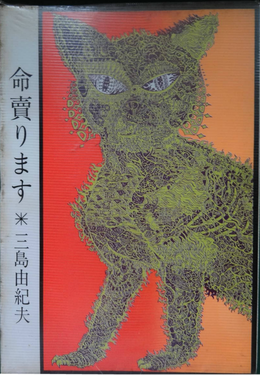
Life for Sale is a 1968 novel by Yukio Mishima. It was first serialised twenty-one times in the weekly magazine Weekly Playboy between 21 May 1968 and 8 October 1968. It was published in hardcover format by Shueisha on 25 December 1968. It was published in paperback by Chikuma Bunko on 24 February 1998. The novel was translated into English by Stephen Dodd and published in paperback format in the United Kingdom by Penguin Classics on 1 August 2019. The English translation received a wider release in paperback by Vintage International on 21 April 2020.

The Frolic of the Beasts is a 1961 novel by Yukio Mishima. It is considered a minor work from Mishima's middle period. Drawing inspiration from Noh plays, specifically the 14th-century Motomezuka, the novel centers on a tragic love triangle depraved by adultery and violence. It is a short novel in length and has a nonlinear narrative structure. The novel was first serialised thirteen times in the weekly magazine Shukan Shincho between 12 June 1961 and 4 September 1961. It was published in hardcover format by Shinchosha on 30 September 1961. It was published in paperback by Shincho Bunko on 10 July 1966. The novel was translated into Italian by Lydia Origlia and published by Feltrinelli in September 1983. The novel was translated into English by Andrew Clare and published in paperback format in the United States and Canada by Vintage International on 27 November 2018. Clare's translation was later published in paperback in the United Kingdom by Penguin Modern Classics on 4 April 2019.
Death in Midsummer is a short story by Japanese writer Yukio Mishima first published in October 1952.
References
- ↑ "Anatomy of Mishima's Most Successful Play Rokumeikan". 2010.
- ↑ "The Hall of the Crying Deer" . Retrieved Apr 18, 2020– via www.imdb.com.
- ↑ "Rokumeikan" . Retrieved Apr 18, 2020– via www.imdb.com.
- ↑ "Opening Day of the World Premiere of the Newly Commissioned Opera, Rokumeikan". www.nntt.jac.go.jp. Retrieved Apr 18, 2020.
- Yukio Mishima. My Friend Hitler, and other plays. Translated by Hiroaki Sato. Columbia University Press, 2002.
